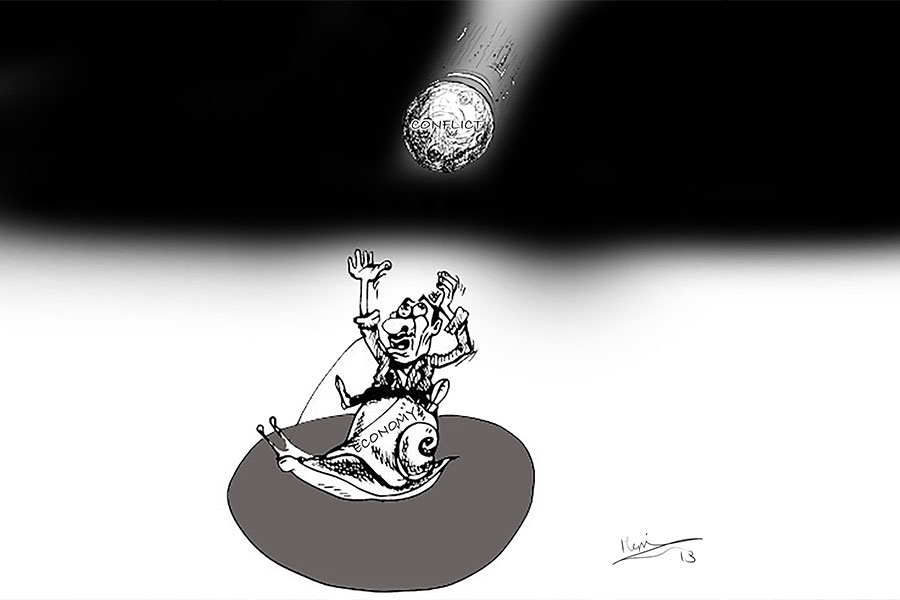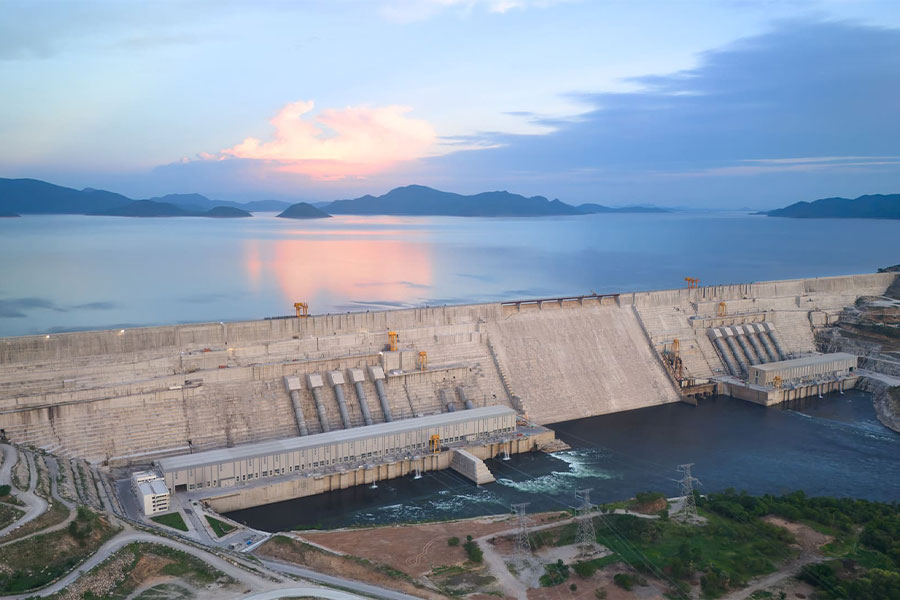
News Analysis | Dec 02,2023
May 25 , 2019
By Hintsa Andebrhan
I have a friend that is self-employed. He was constantly in a hurry, always waking up early in the morning to go to his workplace. He did not have time for social engagements or personal relationships; he was always on the run.
Lately, he is much more relaxed. There is no business he says, it is all dead ends. He does not seem to be like the kind of person that has anywhere to go, just wasting away his days in a country that is supposedly growing in leaps and bounds as far as international institutions and the government are concerned.
We constantly hear of the double-digit miracle Ethiopia was able to achieve in the decade since 2006/07, growing at an average rate of 10.3pc. This continues to be a major political talking point.
This supposed economic miracle continues. This fiscal year, the economy is meant to expand by seven to 8.5pc in gross domestic product (GDP), which is expected to continue on to the next year as well. As far as estimates are concerned, it is economic miracles all around.
It is evident why officials like to brag about these numbers - they want to show that they are doing a good job. It boggles the mind though how rarely international financial institutions bring up the reality on the ground, where citizens are feeling the pinch of a growing cost of living.
GDP is too complicated a measurement. It does not factor in people’s happiness, nor can it exactly pinpoint if there is a growth in employment opportunities or whether or not the economy is becoming more and more competitive. It merely adds together wealth without saying exactly who is making it and how.
Indeed, neither the World Bank nor the International Monetary Fund go into specifics. They do not mention what the rate of unemployment currently is and take a great deal of their stats from government agencies such as the Central Statistics Agency or the National Bank of Ethiopia.
It does not take a genius to realise what is occurring on the ground. A trip to Merkato, which is supposed to be the largest open market in Africa, tells it all. It is eerily empty compared to the hubbub of just a year ago. One mostly finds young people sitting around and chewing khat all day long. This market should be enough of an indicator that the economy is not at all performing to the degree it is estimated to be.
But Merkato is not the only indicator. The cost of living is becoming a headache to many, exports have declined compared to last year, foreign currency continues to be a problem and the failure in the rule of law is severely affecting investor confidence.
These problems are contributing to a loss of dynamism, especially in human productivity. They are problems that are additions to inadequate infrastructure, an ineffectual public sector and policy bottlenecks.
"Abiy's administration needs to act decisively as it has already received a strong mandate from the majority of the populace - avoid bestowing political favours on any coalition partners and avoid being constrained by them. It must move fast to use its political capital in pushing for a comprehensive reform agenda," said Eyob Tesfaye (PhD), a macroeconomist in one of his expert analysis for this paper.
This is a spot on advice. Economic institutions from the Ministry of Trade & Industry to the National Bank of Ethiopia should be filled with people, from the middle to senior levels, that have experience and knowledge. Putting into place people without the required expertise would be too much of a gamble at this time of great economic uncertainty.
PUBLISHED ON
May 25,2019 [ VOL
20 , NO
995]


News Analysis | Dec 02,2023

Viewpoints | Apr 06,2024

Editorial | Nov 21,2020

My Opinion | May 11,2024

Commentaries | Aug 18,2024

Photo Gallery | 156935 Views | May 06,2019

Photo Gallery | 147226 Views | Apr 26,2019

Photo Gallery | 135795 Views | Oct 06,2021

My Opinion | 135287 Views | Aug 14,2021

Dec 22 , 2024 . By TIZITA SHEWAFERAW
Charged with transforming colossal state-owned enterprises into modern and competitiv...

Aug 18 , 2024 . By AKSAH ITALO
Although predictable Yonas Zerihun's job in the ride-hailing service is not immune to...

Jul 28 , 2024 . By TIZITA SHEWAFERAW
Unhabitual, perhaps too many, Samuel Gebreyohannes, 38, used to occasionally enjoy a couple of beers at breakfast. However, he recently swit...

Jul 13 , 2024 . By AKSAH ITALO
Investors who rely on tractors, trucks, and field vehicles for commuting, transporting commodities, and f...

Sep 13 , 2025
At its launch in Nairobi two years ago, the Africa Climate Summit was billed as the f...

Sep 6 , 2025
The dawn of a new year is more than a simple turning of the calendar. It is a moment...

Aug 30 , 2025
For Germans, Otto von Bismarck is first remembered as the architect of a unified nati...

Aug 23 , 2025
Banks have a new obsession. After decades chasing deposits and, more recently, digita...

Sep 15 , 2025 . By AMANUEL BEKELE
The Grand Ethiopian Renaissance Dam (GERD), Africa's largest hydroelectric power proj...

Sep 13 , 2025
The initial budget in 2011 was 80 billion Br, but this figure swelled to a revised cost of 240 billion Br by 2024, a challenge that was exac...

Banks are facing growing pressure to make sustainability central to their operations as regulators and in...

Sep 15 , 2025 . By YITBAREK GETACHEW
The Addis Abeba City Cabinet has enacted a landmark reform to its long-contentious setback regulations, a...